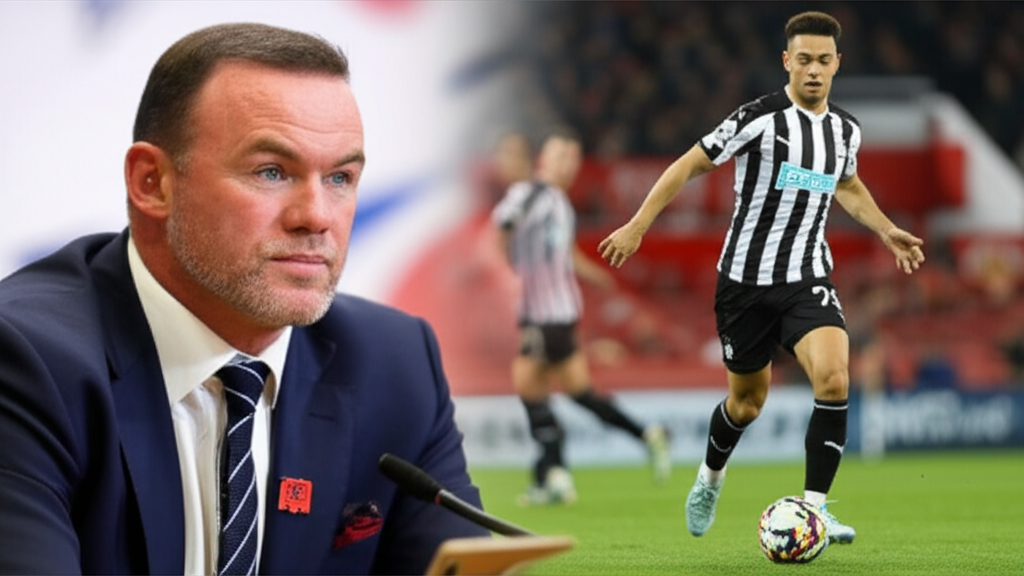Rooney’s Stance on Isak Sparks Debate on Player Loyalty
Manchester United Icon’s Comments on Potential Transfers Draw Attention to Shifting Dynamics in Football
Wayne Rooney, a celebrated figure in Manchester United’s history, has recently voiced strong opinions regarding player loyalty and transfer speculation, specifically in relation to Newcastle United’s Alexander Isak. Rooney’s comments, made in his capacity as a pundit, suggest he would be hesitant to welcome Isak back into a team if he were a Newcastle official, citing the Swedish striker’s reported past interest in a move to Liverpool. This stance has ignited a conversation among football enthusiasts and experts about the evolving nature of player-club relationships and the pressures faced by modern athletes.
The Context of Rooney’s Remarks
The article from The Mirror centers on Rooney’s perspective following reports that Alexander Isak was linked with a move to Liverpool earlier in the season. Rooney, speaking on the TNT Sports show, expressed his viewpoint on how such situations can impact team morale and player commitment. He drew a parallel to his own experiences, though the specific context of his own transfer history is not elaborated upon in the provided summary to suggest a direct equivalence.
Rooney’s assertion that he would be wary of reintegrating a player who had actively sought a departure, even if the move did not materialize, highlights a traditional view of loyalty in football. For many, a player’s commitment to the club should be unwavering, and any perceived attempt to force a transfer, regardless of the circumstances, can be seen as a breach of that trust.
Perspectives on Player Mobility and Club Loyalty
The modern football landscape is characterized by increasing player mobility and lucrative transfer markets. While loyalty has always been a valued trait, the financial incentives and career opportunities available to top players often lead to complex decisions. Rooney’s comments touch upon this tension, suggesting that while players have the right to pursue their career goals, there’s an expectation of dedication to their current club.
Conversely, some argue that players are employees and, like any professionals, are entitled to seek better opportunities. From this viewpoint, Isak’s reported interest in a move, if true, might be seen as a natural progression of his career ambitions rather than a betrayal of loyalty. The financial aspects of the game, with agents, transfer fees, and contract negotiations playing significant roles, also contribute to these dynamics.
The Role of Managers and Club Officials
Rooney’s hypothetical scenario, where he imagines himself in a club official’s position, emphasizes the difficult decisions faced by those in charge of team building. Managers and sporting directors must balance the desire to retain talent with the need for players who are fully committed to the club’s vision. The presence of a player whose mind might be elsewhere can be disruptive, potentially affecting team cohesion and performance.
The article implies that Sir Alex Ferguson, a legendary former manager of Manchester United, might have handled such situations differently. However, the summary does not provide specific details on how Ferguson might have reacted or any concrete instances that support this implication. Without further verifiable information on Ferguson’s direct involvement or documented approach to similar player transfer sagas, this remains a point of speculation.
Weighing the Pros and Cons of Player Commitment
From a club’s perspective, a fully committed player offers several advantages. They are more likely to perform at their best, contribute to team spirit, and be dedicated to achieving collective goals. Retaining such players can provide stability and continuity.
On the other hand, holding onto a player who wishes to leave can be counterproductive. If the player is unhappy, their performance may suffer, and their presence could create a negative atmosphere within the squad. In such cases, facilitating a transfer, even if it means accepting a lower fee than initially hoped for, might be the pragmatic choice.
Implications for Future Transfer Windows
Rooney’s outspokenness serves as a reminder of the ongoing debate surrounding player conduct and club expectations. As transfer windows approach, clubs and players alike will navigate these complex relationships. The comments may influence how fans perceive player actions and how clubs approach contract negotiations and transfer strategies.
For supporters, the ideal scenario often involves players displaying unwavering loyalty, much like the eras Rooney himself experienced under legendary managers. However, the financial realities and global nature of modern football present a different set of challenges for today’s athletes.
Key Takeaways
- Wayne Rooney has expressed reservations about re-integrating a player who has reportedly sought a transfer.
- The comments highlight the ongoing tension between player ambition and club loyalty in contemporary football.
- Modern football’s financial landscape and player mobility create complex situations for both athletes and clubs.
- The decision-making process for managers and club officials involves balancing player commitment with team performance and morale.
- Rooney’s remarks contribute to the broader discussion on player conduct and its impact on team dynamics.
References
The primary source for this article is:


Leave a Reply
You must be logged in to post a comment.